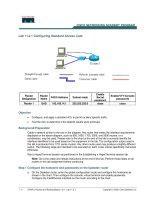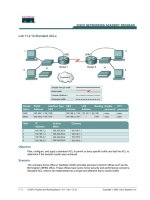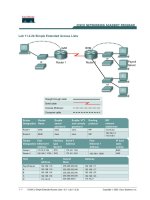C++Lab 11 ARRAYS Dr. John P. Abraham potx
Bạn đang xem bản rút gọn của tài liệu. Xem và tải ngay bản đầy đủ của tài liệu tại đây (198.4 KB, 12 trang )
Lab 11
ARRAYS
Dr. John P. Abraham
If we want to write a program to find the standard deviation of a set of test scores
we need to have a variable that could hold multiple integers instead of assigning an
identifier for each score. An array is the answer to our need. An array is used to store
and process a collection of data of the same type. Let me emphasize that an array can
hold multiple values of the same type; it cannot hold values of different types (we saw
that a struct can do that). An array may also be called a list.
First let us talk about declaring an array. Any program that we might write should
be general enough to apply to different situations; the program we are about to write
should not only let us calculate the standard deviation for exam #1 but also all subsequent
exams. Therefore, we have to decide what is the maximum number of scores we will
have. For now, we will choose 90. This is a limitation of arrays; we are limited to this
number once we code it in. To change it we will have to change the code and recompile.
That is why we call an array a static list. Back to declaring the array. To declare an array
of 90 scores declare it like any other integer variable, but put a [90] in the square
brackets: int scores[90].
Just because we declared an array for 90 elements, there is no need to enter all 90
scores. We can enter any number of scores up to 90. Let us write a program to accept
some scores into an array (terminate the entry when a negative number is entered). We
will have to keep track of the number scores entered. Program Six_1 uses a global
variable for the array to keep the example simple. Program Six_2 shows passing the
array as an argument. Please pay special attention to the fact that the n is decreased by
one to get the actual number of valid scores entered. The last grade (negative score),
although counted, is not a valid score.
Program 11-1
/*************************************************
Accept some scores into an array.
Terminate Entry when a negative number is entered.
Keep track of number of scores entered.
Teaching objective - Data entry into an array.
By Dr. John Abraham
Created for 1370 students
**************************************************/
#include <iostream>
using namespace std;
int scores[90]; //array is declared globally for this example.
int getscores (void);
int main ()
{
int n, i; // n for number of scores. i is a counter.
n = getscores(); //go get the scores and how many
for (i=1; i<=n; i++) cout<<scores[i]<<endl; //show scores.
return(0);
}
int getscores()
{
int n=1;
cout << "ENTER A SCORE AND PRESS ENTER. YOU QUIT ANY TIME BY
ENTERING A NEG NUMBER!\n";
cout << "Enter score# " << n << " ";
cin >> scores[n];
while (scores[n] >= 0)
{
n++;
cout << "Enter score# " << n <<" ";
cin >> scores[n];
}
return n-1; //n-1 actual scores read.
}
Program Run 11-1.
ENTER A SCORE AND PRESS ENTER. YOU QUIT ANY TIME BY ENTERING A
NEG NUMBER!
Enter score# 1 78
Enter score# 2 91
Enter score# 3 88
Enter score# 4 75
Enter score# 5 60
Enter score# 6 88
Enter score# 7 59
Enter score# 8 99
Enter score# 9 78
Enter score# 10 -1
78
91
88
75
60
88
59
99
78
Press any key to continue
Passing array as a parameter is not all that difficult. First, include a prototype
which indicates that the parameter passed is an array, without actually showing the
number of elements in the array - just put []. The function heading also has similar
declaration. The variable declaration however, should show the dimension of the array.
Please compare Program 11-1 to Program 11-2 to see the differences.
Program 11_2.
/*************************************************
Accept some scores into an array.
Terminate Entry when a negative number is entered.
Keep track of number of scores entered.
Teaching objective - Pass Array as a parameter.
By Dr. John Abraham
Created for 1370 students
**************************************************/
#include <iostream>
using namespace std;
int getscores (int scores[]); //prototype for passing an array
int main ()
{
int scores[90]; //array of 90 integers named
scores
int n, i; // n for number of scores.
i is a counter.
n = getscores(scores); //go get the scores and how many
for (i=1; i<=n; i++) cout<<scores[i]<<endl; //show scores.
return(0);
}
int getscores(int scores[])
{
int n=1;
cout << "ENTER A SCORE AND PRESS ENTER. YOU QUIT ANY TIME BY
ENTERING A NEG NUMBER!\n";
cout << "Enter score# " << n << " ";
cin >> scores[n];
while (scores[n] >= 0)
{
n++;
cout << "Enter score# " << n <<" ";
cin >> scores[n];
}
return n-1; //n-1 actual scores read.
}
Program Run 11-2.
ENTER A SCORE AND PRESS ENTER. YOU QUIT ANY TIME BY ENTERING A
NEG NUMBER!
Enter score# 1 88
Enter score# 2 77
Enter score# 3 76
Enter score# 4 -1
88
77
76
Press any key to continue
It is important to note that the array parameter passed to the function is neither a
call-by-value, or a call-by-reference, but a new kind of parameter known as an array
parameter. It follows that when passing an array neither a copy of the entire array is
passed nor every memory location of entire array are passed, instead the memory location
of the first element of the array is passed. Therefore, it is not necessary to pass the size of
the array, just include square brackets with nothing in it. Both the calling module and
called module calculate the memory location of a particular element using abase and
offset (calculated by index). More about addressing modes will be taught in future
courses.
In developing this chapter I will use the standard deviation example. So let me
explain what it is. In simple terms the standard deviation is a weighted average of
differences of all the scores from the mean. In order to calculate it we follow the
following steps:
1. Find the mean (average) of all the scores.
2. Find the difference of each score from the mean.
3. Square the differences (item #2).
4. Find the sum of all squared differences (item #3).
5. Find the variance by dividing the sum (item #4) by the number of scores
minus one.
6. Find the square root of the variance (item #5).
1. Find the mean of the scores entered.
Program 11_3.
/*************************************************
Accept some scores into an array.
Terminate Entry when a negative number is entered.
Keep track of number of scores entered.
Teaching objective - Pass Array as a parameter.
By Dr. John Abraham
Created for 1370 students
**************************************************/
#include <iostream>
using namespace std;
int getscores (int scores[]);
float calcMean (int scores[], int);
void display(int, int scores[], float);
//mmmmmmmmmmmmmmmmmmmmmmmmmmmmmmmmmmmmmmmmmmmmmmmmmmm
int main ()
{
int scores[90];
int n; // n for number of scores.
float mean;
n = getscores(scores); //go get the scores and how many
mean = calcMean(scores, n);
display(n,scores,mean);
return(0);
}
//mmmmmmmmmmmmmmmmmmmmmmmmmmmmmmmmmmmmmmmmmmmmmmmmmmmmmm
int getscores(int scores[])
{
int n=1;
cout << "ENTER A SCORE AND PRESS ENTER. YOU QUIT ANY TIME BY
ENTERING A NEG NUMBER!\n";
cout << "Enter score# " << n << " ";
cin >> scores[n];
while (scores[n] >= 0)
{
n++;
cout << "Enter score# " << n <<" ";
cin >> scores[n];
}
return n-1; //n-1 actual scores read.
}
//ffffffffffffffffffffffffffffffffffffffffffffffffffffffffff
float calcMean(int scores[], int n)
{
int sum=0;
int i; //use for counter
float m; //local variable for mean
for (i=1; i <=n; i++) sum += scores[i]; //add all scores
m = float(float(sum)/n);
return m;
}
//ffffffffffffffffffffffffffffffffffffffffffffffffffffffffffff
void display (int n, int scores[], float mean)
{
int i;
cout << n<< " Scores were entered. They are: \n";
for (i=1; i<=n; i++) cout<<scores[i]<<endl; //show scores.
cout << "The mean is: "<<mean <<endl;
}
Program Run 11_3.
ETER A SCORE AD PRESS ETER. YOU QUIT AY TIME BY ETERIG
A EG UMBER!
Enter score# 1 88
Enter score# 2 77
Enter score# 3 83
Enter score# 4 85
Enter score# 5 96
Enter score# 6 68
Enter score# 7 -1
6 Scores were entered. They are:
88
77
83
85
96
68
The mean is: 82.8333
Press any key to continue
Standard deviation program continued.
2. Find difference of each score from the mean.
3. Square the differences.
4. Add the squared differences.
5. Find the variance by dividing the sum by the number of scores minus one.
6. Find the square root of the variance.
Program 11_4.
/*************************************************
Accept some scores into an array.
Terminate Entry when a negative number is entered.
Keep track of number of scores entered.
Find difference of each score from the Mean.
Square the differences and add the squares.
Teaching objective - Pass Array as a parameter.
By Dr. John Abraham
Created for 1370 students
**************************************************/
#include <iostream>
#include <iomanip>
#include <math.h> //for square root function.
using namespace std;
int getscores (int scores[]);
float calcMean (int scores[], int);
float sumSquares (int, int scores[], float diff[], float
diffSq[],float);
float stdDeviation(int, float);
void Table(int, int scores[], float diff[], float diffSq[], float,
float);
//mmmmmmmmmmmmmmmmmmmmmmmmmmmmmmmmmmmmmmmmmmmmmmmmmmm
int main ()
{
int scores[90];float diff[90], diffSq[90];
int n; // n for number of scores.
float mean, sumSq, stDev;
n = getscores(scores); //go get the scores and how many
mean = calcMean(scores, n);
sumSq = sumSquares (n,scores,diff,diffSq,mean);
stDev = stdDeviation(n, sumSq);
Table(n, scores, diff,diffSq, mean, stDev);
return(0);
}
//mmmmmmmmmmmmmmmmmmmmmmmmmmmmmmmmmmmmmmmmmmmmmmmmmmmmmm
int getscores(int scores[])
{
int n=1;
cout << "ENTER A SCORE AND PRESS ENTER. YOU QUIT ANY TIME BY
ENTERING A NEG NUMBER!\n";
cout << "Enter score# " << n << " ";
cin >> scores[n];
while (scores[n] >= 0)
{
n++;
cout << "Enter score# " << n <<" ";
cin >> scores[n];
}
return n-1; //n-1 actual scores read.
}
//ffffffffffffffffffffffffffffffffffffffffffffffffffffffffff
float calcMean(int scores[], int n)
{
int sum=0;
int i; //use for counter
float m; //local variable for mean
for (i=1; i <=n; i++) sum += scores[i]; //add all scores
m = float(float(sum)/n);
return m;
}
//fffffffffffffffffffffffffffffffffffffffffffffffffffffffffffff
float sumSquares (int n, int scores[], float diff[],
float diffSq[],float mean)
{
int i; float ss=0.0;
for (i=1; i <=n; i++)
{
diff[i] = scores[i]-mean;
diffSq[i] = diff[i] * diff[i];
ss += diffSq[i];
}
return ss;
}
//fffffffffffffffffffffffffffffffffffffffffffffffffff
float stdDeviation(int n, float sumSq)
{
float variance;
variance = sumSq/(n-1);
return (float(sqrt(variance)));
}
//fffffffffffffffffffffffffffffffffffffffffffffffffff
void Table(int n, int scores[], float diff[],
float diffSq[], float mean, float stDev)
{
int i; float ss=0;
cout << "\nStadard Deviation for " << n<<" Scores. Mean: "<<mean
<<endl;
cout <<" \n";
cout <<setw(10) <<"Score"<<setw(10) <<"Dev" <<setw(10) << "Dev Sq"
<<" Sum of dev2)\n";
cout <<" \n";
cout << setiosflags(ios::fixed);
for (i = 1; i<=n; i++)
{
ss += diffSq[i];
cout << setw(10) << setprecision(2) << scores[i]
<< setw(10) << setprecision(2) << diff[i]
<< setw(10) << setprecision(2) << diffSq[i]
<< setw(10) << setprecision(2) << ss << endl;
}
cout <<" \n";
cout <<"Standard Deviation "<< setprecision(2) <<stDev <<endl;
}
Program Run 11-4
The program 11-4 is modified to read the scores from a file. A file must be created and
placed in the same subdirectory where the source code is saved. You can create the file
using notepad. Make sure to save the file with the name “scores1.dta”. In order to do
that you must change the file type to “all files” instead of default text files. Alternatively
you can save the file as a text file using any name, but make sure to change the name of
the file in your source code (example “myfile.txt”).
/*************************************************
Read scores from a file into an array.
Keep track of number of scores entered.
Find difference of each score from the Mean.
Square the differences and add the squares.
find stadard deviation
create a table
Teaching objective - Pass Array as a parameter.
By Dr. John Abraham
Created for 1370 students
**************************************************/
#include <iostream>
#include <fstream>
#include <iomanip>
#include <cmath> //for square root function.
using namespace std;
int getscores (int scores[]);
float calcMean (int scores[], int);
float sumSquares (int, int scores[], float diff[], float
diffSq[],float);
float stdDeviation(int, float);
void Table(int, int scores[], float diff[], float diffSq[], float,
float);
//mmmmmmmmmmmmmmmmmmmmmmmmmmmmmmmmmmmmmmmmmmmmmmmmmmm
int main ()
{
int scores[90];float diff[90], diffSq[90];
int n; // n for number of scores.
float mean, sumSq, stDev;
n = getscores(scores); //go get the scores and how many
mean = calcMean(scores, n);
sumSq = sumSquares (n,scores,diff,diffSq,mean);
stDev = stdDeviation(n, sumSq);
Table(n, scores, diff,diffSq, mean, stDev);
cin >>n;
return(0);
}
//mmmmmmmmmmmmmmmmmmmmmmmmmmmmmmmmmmmmmmmmmmmmmmmmmmmmmm
int getscores(int scores[])
{
ifstream infile;
infile.open("scores1.dta");
if (!infile) cout << "Data file does not exist!";
int n=0;
while(!infile.eof())
{
n++;
infile >> scores[n];
}
return n; //n-1 actual scores read.
}
//ffffffffffffffffffffffffffffffffffffffffffffffffffffffffff
float calcMean(int scores[], int n)
{
int sum=0;
int i; //use for counter
float m; //local variable for mean
for (i=1; i <=n; i++) sum += scores[i]; //add all scores
m = float(float(sum)/n);
return m;
}
//fffffffffffffffffffffffffffffffffffffffffffffffffffffffffffff
float sumSquares (int n, int scores[], float diff[],
float diffSq[],float mean)
{
int i; float ss=0.0;
for (i=1; i <=n; i++)
{
diff[i] = scores[i]-mean;
diffSq[i] = diff[i] * diff[i];
ss += diffSq[i];
}
return ss;
}
//fffffffffffffffffffffffffffffffffffffffffffffffffff
float stdDeviation(int n, float sumSq)
{
float variance;
variance = sumSq/(n-1);
return (float(sqrt(variance)));
}
//fffffffffffffffffffffffffffffffffffffffffffffffffff
void Table(int n, int scores[], float diff[],
float diffSq[], float mean, float stDev)
{
int i; float ss=0;
cout << "\nStadard Deviation for " << n<<" Scores. Mean: "<<mean
<<endl;
cout <<" \n";
cout <<setw(10) <<"Score"<<setw(10) <<"Dev" <<setw(10) << "Dev Sq"
<<" Sum of dev2)\n";
cout <<" \n";
cout << setiosflags(ios::fixed);
for (i = 1; i<=n; i++)
{
ss += diffSq[i];
cout << setw(10) << setprecision(2) << scores[i]
<< setw(10) << setprecision(2) << diff[i]
<< setw(10) << setprecision(2) << diffSq[i]
<< setw(10) << setprecision(2) << ss << endl;
}
cout <<" \n";
cout <<"Standard Deviation "<< setprecision(2) <<stDev <<endl;
}
Assignment:
Write a program to convert a number between 0 and 20000 (exclusive) into words. The program must use
arrays to hold words such as “one, two, three, etc.” Here is a sample run.









